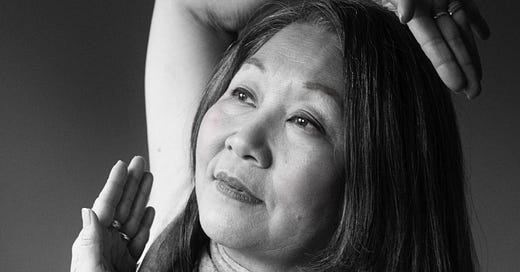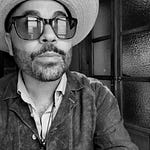I grew up in a little town in Eastern Oregon, and while my family was artsy and musical, we didn’t engage much with dance (and there wasn’t a whole lot of dance performance available to engage with, where we lived). It wasn’t until college (in Portland, Oregon) that I saw my first boundary-pushing modern dance show, and I was blown away by the intense feelings that lingered in my body and spirit for weeks after that evening of watching bodies communicate the monstrous and the possible so viscerally.
I’m afraid I couldn’t tell you anything about who was performing or what the show was supposed to be about (I did poke around in the Reed dance archives to see if I could find it, but no dice), but there are scenes that I could still describe to you perfectly. I’d still be hard-pressed to “explain” them—but in describing them, I’d feel that wash and tug of feelings all over again.
I grew up in a little town in Eastern Oregon, and while I remember a day or two over the course of my K-12 education where the incarceration of Japanese Americans during World War II was mentioned, it was never framed as a particularly Oregon story—much less a story about our neighbors. But it wasn’t so long ago that thousands of Japanese Americans in Oregon—US citizens who had built lives and businesses and community in this state—were looted of everything they owned, rounded up, and confined in Portland in a holding area meant for livestock. Some of them were then shipped out to labor camps, including the Nyssa “detention facility” in Malheur County—just a short hop over the mountains from the place where I grew up.
These families, whose homes and livelihoods had just been stolen from them, were now sleeping in canvas tents, stooping over fields of beets, and adhering to an 8PM curfew—navigating profound dislocation and all the prejudices of the war among the rural people whose grandkids I grew up with.

I can’t help but wonder how my understanding of my home and community might have been deepened and complicated, as I was growing up, by a more intimate telling of this story as our story. I’ve wondered this about so many of the stories of my home that I’ve only really begun to learn as an adult.
And I also wonder, almost daily, how our lives together—in family, among neighbors, in community—might have been different if all of us had grown up with more literacy in embodied communication—more respect for the immensity of what happens between us before, between, and beyond words.
In this episode of Kinward Podcast, I try to breathe and move, as well as speak, with Chisao Hata—a dancer; an artist; a community weaver and “memory activist” based in Portland, Oregon; and the daughter of two Japanese Americans who met and married at a WWII incarceration site in Poston, Arizona. Throughout this conversation, and in her work and life, Chisao affirms the power of the embodied arts in our efforts to become an America that is less blinkered, less black and white—more spacious, just, and empathetic. This is a timely and rich conversation for these polarized and amnesiac times.
Chisao is a performing artist, community organizer, and global citizen artist. Her work shares the Japanese-American story with communities from Hiroshima, Japan to Cuba, and New Mexico to Ontario, Oregon. Her art incorporates community engagement and social action, and foregrounds omitted histories. She knows that “Artists, people of color and immigrants will create our New America.” Her training in modern dance, expressive arts, physical theater, healing through the arts, community facilitation, poetry, taiko drumming and classical Japanese dance integrate with her peace and justice work in diverse communities. She is an Artist Organizing for Change with the Dance Exchange, based in Takoma Maryland, and is currently hard at work in collaboration with Portland Oregon’s Vanport Mosaic Project to create and curate “Coming Home: A Week of Memory Activism in Portland’s Old Town.” The Week of Action will begin on Saturday, Sept 28, and if you’re in Portland that week you should definitely plan to spend some time immersed in it.
When Chisao and I discussed, in this conversation, her years as an arts teacher in Portland’s public schools, she said that she has always considered herself “a warrior for imagination,” driven to protect the innate creative capacities that all of us are born with. Kristen Brayson, Director of Visual and Performing Arts for Portland Public Schools, says of Chisao, “There's not one group she hasn’t touched with her activism through art. Her themes are exigent for our times and urge participants to ponder their worldview and take action for change.”
When I was lucky enough, a few months ago, to spend time inside of a conversation that Chisao was facilitating in partnership with Oregon Humanities and Street Books, I did indeed emerge with some actionable next steps, as Brayson suggests. And—in the wake of 90 minutes spent not just talking about race and othering but also moving with these topics, circling around and outside of them, listening, making eye contact, and offering gestures—I also emerged with a deeper suite of responses and bewilderments beyond words.
Those embodied moments, legible or not, hold my memory of the conversation and make it vivid and rich. It’s a conversation whose echoes I’ll continue to turn over and feel out. I’m not sure that richness like this can come across in an audio-only format, but it was helpful, for me, anyway, to speak with Chisao in her home, to feel the field and the feels, and to ask some of the kinds of questions that only emerge in spacial proximity. Perhaps you can find your own grounding in this wise conversation by walking or otherwise moving while you listen. This is a good one to dance with.
Gratitudes and shout-outs for this episode include: to Chisao, for hosting this conversation in her home and modeling a dancer’s comfort with ambiguity; to Oregon Humanities, for offering many spaces across the state for reflecting beyond certainty, including a Conversation Project with Chisao Hata that you can request to host if you are based in Oregon; to Street Books for hosting Chisao’s conversation (and mine) a few months ago for a staff training, and for their daily work of bringing words and connection to unhoused people; to the Vanport Mosaic Project for curating embodied experiences of little-known histories—do check out their Week of Action if you’re in Portland at the end of September; to my sweet son Fable for helping to harvest the last of the sweet corn yesterday; and to all the beings seen and unseen who are holding me in my second pregnancy. Thank you.
And to all of you, for listening: Thank you.















Share this post